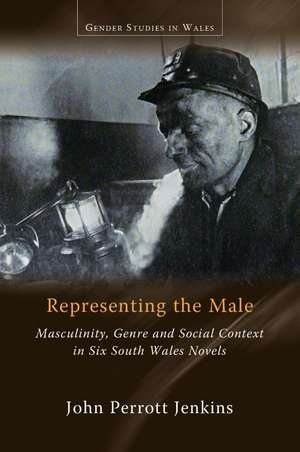Representing the Male: Masculinity, Genre and Social Context in Six South Wales Novels: Gender Studies in Wales
Autor John Perrott Jenkinsen Limba Engleză Paperback – 6 oct 2021
The book undertakes a gendered analysis of the male characters in six South Wales novels written between 1936 and 2014, uncovering a critique of the form of masculine hegemony propagated by structural patriarchy and industrial capitalism. The novels depict characters confined to a limited repertoire of culturally endorsed behavioral norms that prohibit the expression and cultivation of the self. Ideologically subservient and “feminized” in the context of work, the working-class characters are ideologically dominant and “masculinized” at home. As the characters negotiate, resist, or strive to reconcile the irreconcilable demands of such gendered practices, Jenkins shows how recurring patterns of exclusion, inadequacy, and mental instability become evident in their representation.
Preț: 192.44 lei
Nou
Puncte Express: 289
Preț estimativ în valută:
36.83€ • 38.22$ • 30.78£
36.83€ • 38.22$ • 30.78£
Carte disponibilă
Livrare economică 24 februarie-10 martie
Livrare express 07-13 februarie pentru 24.94 lei
Preluare comenzi: 021 569.72.76
Specificații
ISBN-13: 9781786837783
ISBN-10: 1786837781
Pagini: 256
Dimensiuni: 140 x 216 x 15 mm
Greutate: 0.34 kg
Editura: University of Wales Press
Colecția University of Wales Press
Seria Gender Studies in Wales
ISBN-10: 1786837781
Pagini: 256
Dimensiuni: 140 x 216 x 15 mm
Greutate: 0.34 kg
Editura: University of Wales Press
Colecția University of Wales Press
Seria Gender Studies in Wales
Notă biografică
Following a career in teaching, lecturing, and writing on English and American literature, John Perrott Jenkins is currently working on postcolonialism, border identity, and the social construction of gender in anglophone Welsh fiction. He was born in Wales and now lives in Bath, England.
Cuprins
Introduction
1. Dominant, Residual, Emergent: Forms and Formations of Male
Identity in Gwyn Jones’s Times Like These (1936)
2. Genre and the Tribulations of Masculinity in Lewis Jones’s
Cwmardy (1937)
3. Investigating Genre and Gender in Menna Gallie’s Strike for a Kingdom (1959)
4. Genre and the Embodied Male in Ron Berry’s So Long, Hector Bebb
(1970)
5. Patriarchy, Power and Politics: Masculinities in Roger Granelli’s
Dark Edge (1997) and Kit Habianic’s Until Our Blood is Dry (2014)
Conclusion
Bibliography
1. Dominant, Residual, Emergent: Forms and Formations of Male
Identity in Gwyn Jones’s Times Like These (1936)
2. Genre and the Tribulations of Masculinity in Lewis Jones’s
Cwmardy (1937)
3. Investigating Genre and Gender in Menna Gallie’s Strike for a Kingdom (1959)
4. Genre and the Embodied Male in Ron Berry’s So Long, Hector Bebb
(1970)
5. Patriarchy, Power and Politics: Masculinities in Roger Granelli’s
Dark Edge (1997) and Kit Habianic’s Until Our Blood is Dry (2014)
Conclusion
Bibliography
Recenzii
"This innovative and illuminating analysis of the representation of masculinity in south Wales coalfield fiction digs deep beneath the surface of the texts and mines a rich seam of profound gender complexity and contradiction. To read it is an energising intellectual experience, which highlights the general relevance of these novels."
"John Jenkins’s sensitive and acute exploration of these novels reinstates the unjustly overlooked Ron Berry into the canon, and persuasively demonstrates that damaged and toxic masculinities are still a feature of post-industrial and post-devolution Welsh literary cultures – this is a fine addition to the field of Welsh literary masculinities."
"Jenkins’s book is a long-overdue, trenchant and exceptionally perceptive analysis of the culture of masculinity in the Valleys, as represented in some key industrial novels including Lewis Jones’s Cwmardy and Menna Gallie’s Strike for a Kingdom. Ranging from the 1930s to the 1980s, it shows how a persistently macho culture can repress and warp both women and men … For Welsh readers, particularly, this is an essential book, analysing a phenomenon that is so ingrained in our culture that it has for too long been simply accepted as the norm."



